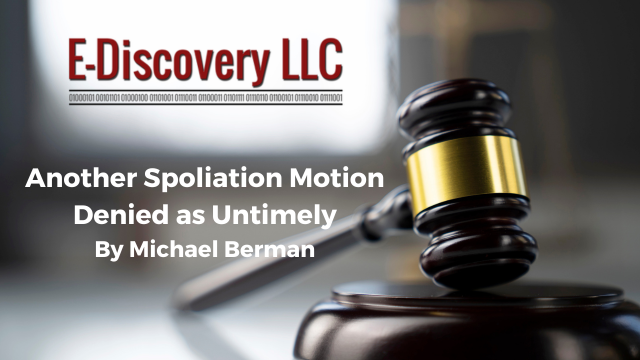
[EDRM Editor’s Note: The opinions and positions are those of Michael Berman.]
In Smith v. Wormuth, 2024 WL 1012887 (D. Md. Mar. 8, 2024), the District Court again denied a spoliation motion as untimely. In the immortal words of Yankee Hall of Famer Yogi Bera: “It’s deja vu all over again.”
Smith was an employment dispute arising out of a contentious relationship, with an allegation of failure to grant a reasonable, requested accommodation.
The Court, followed established precedent in deciding when a spoliation motion must be filed. Further, it held that a litigant could not, in my words, dress up an effort to reargue a substantive issue in the clothes of a spoliation claim.
The Court, followed established precedent in deciding when a spoliation motion must be filed. Further, it held that a litigant could not, in my words, dress up an effort to reargue a substantive issue in the clothes of a spoliation claim.
Michael Berman on Smith v. Wormuth, 2024 WL 1012887 (D. Md. Mar. 8, 2024).
Courts have rejected, for example, efforts to “dress up” a garden-variety discovery dispute as a spoliation motion. A Wolf in Sheep’s Clothing: Litigant Can’t Convert a Discovery Dispute Into a Sanctions Motion. Courts have also rejected belated efforts to morph a motion to compel into a sanctions motion. When Should a Spoliation Motion Be Filed and Decided? – – An Update.
Here, the Smith Court rejected an effort to reargue a substantive issue in the guise of a spoliation motion.
While cross-motions for summary judgment were pending, Ms. Smith filed a “Motion for Reconsideration of the Dismissal of Hostile Work Environment Claim, Amend Add[1] Claim for Tampering and Sanction.”
The Court held that the Rule 54(b) motion for reconsideration was untimely under a Local Rule that required filing for reconsideration within 14 days after entry of the order. Ms. Smith filed more than two years after the challenged order. The Court wrote: “A delay of this magnitude warrants denial.”[2]
Importantly, the Court added: “Although a motion for reconsideration is not the proper vehicle for such a request, the court also finds the Motion for Reconsideration to be untimely to the extent it seeks a spoliation sanction against Defendant in the form of reinstituting Plaintiff’s hostile work environment claims.” Id. at *5.
The Smith Court quoted Judge Grimm’s decision in Goodman v. Praxair Services, Inc., 632 F. Supp. 2d 494, 506-08 (D. Md. 2009), setting forth the factors governing timeliness of spoliation motions, and quoted Goodman’s statement that “[c]ourts are justifiably unsympathetic to litigants who, because of inattention, neglect, or purposeful delay aimed at achieving an unwarranted tactical advantage, attempt to reargue a substantive issue already ruled on by the court through the guise of a spoliation motion.”
The District of Maryland has repeatedly applied the Goodman standard. See When Should a Spoliation Motion Be Filed and Decided? – – An Update; and, Spoliation Motions Denied as Untimely – Another Wake-Up Call.
In my opinion, “[t]here are two general guiding principles [governing when spoliation motions should be filed and decided]. First, prudence suggests prompt filing of such motions soon after learning of a basis for doing so. Second, courts are likely to wait until a full record is developed before deciding the motion.” Id; see, e.g., M. Berman, et al., eds., “Electronically Stored Information in Maryland Courts” (Md. State Bar Ass’n. 2020), 229 (collecting cases).
To paraphrase the Hon. Andrew J. Peck (ret.), these decisions on the timing of raising spoliation issues “should serve as a wake-up call to the Bar in this District….” William A. Gross Const. Assocs., Inc. v. Am. Mfrs. Mut. Ins. Co., 256 F.R.D. 134, 134 (S.D.N.Y. 2009).
The Smith Court’s analysis was compelling:
Plaintiff filed her Motion for Reconsideration almost a year after the close of discovery and almost four months after her original motion for summary judgment. … Plaintiff made no effort to confer with Defendant prior to filing in contrast to the requirements of Rule 37(a) and Local Rule 104.7. Plaintiff further failed to comply with this court’s order regarding discovery. … And finally, Plaintiff’s purported explanation for the delay is merely that counsel needed time to review the discovery information despite the fact that some of the issues raised were known to Plaintiff prior to the filing of this lawsuit. … Considering the Goodman factors, and that Plaintiff’s request is, by the very relief requested, an attempt to reargue a substantive issue ruled on by this court over two years ago, the court concludes that Plaintiff’s request for spoliation sanctions in the form of reinstituting Plaintiff’s hostile work environment claims is untimely and will be denied.
Smith v. Wormuth, 2024 WL 1012887 at *5 (D. Md. Mar. 8, 2024) (cleaned up; emphasis added).
In a comprehensive decision, the Court denied the motion for reconsideration and sanctions, denied plaintiff’s summary judgment motion, and granted in part and denied in part defendant’s cross-motion for summary judgment.
Yogi Berra also said: “If you don’t know where you are going, you might wind up someplace else.” That is good advice. If you do not know when to file a spoliation motion, you wind up forfeiting it.
Notes
[1] “Amend Add” was the title of the motion.
[2] In a footnote, the Court added: “Plaintiff asserts in her reply brief that the Motion for Reconsideration was filed ‘under Rule 60(b)(6) and 60(d).’ … This statement is, at best, the product of willful ignorance, and, at worst, a blatant falsehood.”


